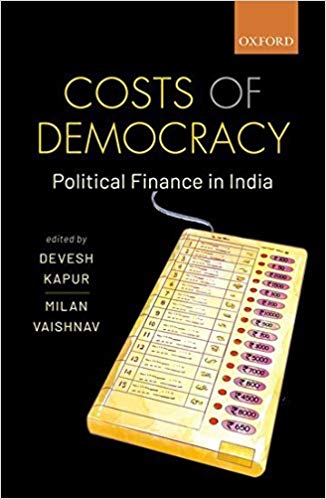One of the biggest challenges facing India’s democracy is the growing role of money in elections. During the 2014 parliamentary elections politicians jointly spent an estimated 5 billion dollars. As the spending increases every election, this amount will likely be even surpassed in the upcoming 2019 elections. These extravagant campaign costs are worrisome, for a range of reasons. High campaign expenses foster corruption, threaten the quality of governance and undermine the fairness of the electoral process. Rich candidates or candidates with wealthy backers are at an advantage while poor but capable candidates are discouraged from even running for elections. These campaign costs also foster collusive deal-making between politicians and business actors, who expect to be compensated for their campaign contributions with licenses, contracts and other favours. As a result, discontent and worries about the high costs of elections are animating regular newspaper commentaries, as well as a number of recent policy initiatives from Modi’s government.
In that light, it was high time that scholars of Indian politics pay more sustained attention to political finance. In bringing together a varied and insightful set of essays in a highly readable edited volume, Devesh Kapur and Milan Vaishnav have done a great service to both scholars of Indian politics as well as New Delhi’s policymakers. By bringing together a group of experienced and knowledgeable scholars employing a refreshing mix of research methods, Costs of Democracy succeeds in providing a comprehensive overview of the policies, character and effects of political finance in India. Through a combination of thorough on-the-ground ethnographic accounts, clear-headed policy analyses as well as overview studies based on surveys, election data and even cement consumption statistics, the book discusses not only the various ways in which politicians put money to use during elections, but also the ways in which policy-making could address the resulting threats to India’s democracy.
The resulting picture is both fascinating and gloomy. The fascinating part concerns the creative strategizing that surrounds the use of money in Indian elections. Money, as the articles in this book show, shapes politics in stunningly wide-ranging ways. Neelanjan Sircar discusses the role of money in candidate selection, highlighting that political parties—out of concern for meeting campaign expenses—are inclined to select wealthy candidates. Other essays highlight the kinds of collusive deal making that campaign financing generates—from exchanges between builders and politicians—the focus of Devesh Kapur and Milan Vaishnav’s essay—to the flows of money between politicians and various kinds of brokers and ‘social workers’ (Björkman and Witsoe’s piece). Particularly fascinating is also Collins’s account of how the need for campaign finance forces a poor political party in Tamil Nadu (the VCK) into a dependent relationship with a richer political party (the AIADMK). This party pays for VCK’s campaign costs in exchange for political subservience.

